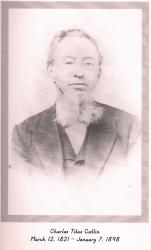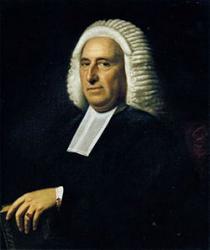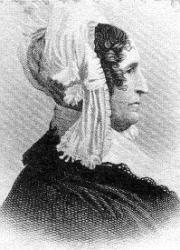Planning worship?
Check out our sister site, ZeteoSearch.org,
for 20+ additional resources related to your search.
- |
User Links
Person Results
‹ Return to hymnal



Export as CSV
Samuel Burnham
Hymnal Number: 1444 Author of "Be joyful in God, for his mercy and grace" in Songs of Pilgrimage
Samuel Burnham
C. T. Catlin

Hymnal Number: 1279 Author of "I saw a wayworn traveler" in Songs of Pilgrimage Charles Titus Catlin was born on March 12, 1821 near Fort Ann, New York. He was the oldest of five children of Leonard and Lucinda Catlin. His family moved from the Fort Ann, New York area to West Troy, New York between 1830 and 1835. According to family oral tradition Leonard Catlin operated a canal boat business and Charles worked as a canal boat pilot. While Charles traveled the Erie Canal, he wrote many poems with deeply religious themes. His earliest extant poem dates to 1838. His poetry infers that he was well educated and according to family oral tradition could read Greek as easily as we read English.
On March 27, 1842, Charles Titus Catlin married Jane A. Morrison and had three children with her by 1848. By early 1847 Charles started to lament the Erie Canal life that takes him away from his “…children dear” and his“…fond and faithful wife.” On May 1, 1847 Charles sold his 80 - ton scow the “Charles T. Catlin”. Based on his poetry he continued to pilot on the Erie Canal but by 1850 he was working as a tinsmith in his father’s and brother’s tinsmithing shop, “L. Catlin and Son.” He continued to write poetry and has some of his works published in the local newspaper, The West Troy Advocate. By 1857 Charles moved with his family from West Troy to Troy, New York. Charles worked as a tinsmith until 1859 when he started working for his father as a bookkeeper. From 1860 to 1868 his occupation is listed as bookkeeper.
In 1869, he was listed as the principal of the William Rich School in Troy, New York. The William Rich School was an all African-American school. When the school was closed in the spring of 1873, Charles later in the year was ordained at the 5th Street Baptist Church in Troy on December 13, 1873. Based on his extant sermons, Charles worked as a circuit pastor for two churches in Rennsalear County from 1876 to 1879. On December 7, 1879 his wife of 37 years died and he moved to East Poestenkill, New York in 1880, where he was the pastor of the East Poestenkill Baptist Church.
On April 8, 1883, Charles married Cynthia A. Wager, a widowed woman with one surviving child. The couple had a 28 year age difference between them. Together the couple had three children, one of which lived to adulthood. Charles Titus Catlin continued to pastor at the East Poestenkill Baptist church until he became ill before his death on January 7, 1898. He was buried in the Oakwood Cemetery in Troy next to his first wife. As of the early 21st Century he has over 366 descendants by his youngest surviving son from his second marriage.
Notes on the song “I Long to be There” and “Deliverance will Come”:
Based on the poetry of Charles Titus Catlin, Charles appears to have been caught up in the anticipation of the expected Second Advent of Christ in the early 1840’s. He writes in 1843 the poem, “An Admonition to Inconsiderate Judges of the Miller Theory”. In this poem he writes, ‘If the cause is of God, Tis useless on Miller, to Hamper.”
In spite of the “Great Disappointment” the poem “I Long to be There” passionately anticipates a better world to come. Charles work, originally written as a 10 stanza poem, is found as part of his paste book collection of poetry dating from the late 1840’s to the mid 1850’s. Most of the poems written in the book were published under his name in the West Troy Advocate.
“Deliverance Will Come” has long been considered by the Catlin Family to have been an original work by Charles Titus Catlin. The poem is found among his collection of paste book poetry. In Charles T. Catlin’s two poetry books he appears to be very careful to only attribute his work with his initials C. T. C or published works clearly list him as the author. This poem is clearly marked with his initials. But the poem has an earlier claim to authorship by J. B. Matthias that predates Charles’ work. While Charles original authorship for “Deliverence Will Come” is doubtful, “I Long to be there” has the only and exclusive attribution.
Sources:
The Catlin Family Bible; The West Troy Advocate, New York State Archives, Albany, New York; New York State Archives, Albany, New York; Written Works by Charles Titus Catlin. Collected and Researched by Gertrude Catlin and Gary R. Catlin. Prepared by Elmer and Bonnie Taylor for the Catlin Family Reunion July 14, 2007. (A collection of the poetry from two original booklets of poetry written by Charles Titus Catlin from 1838 to the mid 1850’s); Troy City Directories, Troy Public Library, Troy New York. From 1854 to 1879; Recorded Oral History of the Descendents of Edwin R. Catlin, part of Betty Hall Payne Collection. New York Genealogical and Biographical Society.; U.S. Census Records and New.York.State. Census Records; History of the First Baptist Chruch at East Poestenkill, wrtitten by Marian Legenbauer and Ellen Dzembo from recrods in the chruch archives; Oakwood Cemetery Interment Records, 50-101st Street, Troy, New York 121180
--Gary Catlin, great-great-grandson of C. T. Catlin
C. T. Catlin
James A. Libby
1832 - 1907 Person Name: James Albert Libby Hymnal Number: 1141 Author of "Before thy face, with lifted hands" in Songs of Pilgrimage
James A. Libby
Mather Byles

1706 - 1788 Person Name: M. Byles Hymnal Number: 432 Author of "When wild confusion wrecks the air [world]" in Songs of Pilgrimage Byles, Mather, D.D., born 1706, educated at Harvard, 1725, died 1788. He was an eminent Congregational Minister of Boston, and, for his time and place, an elegant scholar. He corresponded with, and was well thought of by the English wits and literati. His Toryism brought him into trouble at the Revolution, causing him, in his own words, to be “guarded, reguarded, and disregarded."
His Sermons wore published at various dates from 1729 to 1771, and his Poems in 1727, 1736, and 1744. Of the Appendix to Tate and Brady, published by S. Kneeland in 1760, he edited hymns 77 to 100 inclusive, of which hymns 78, 79, and 80 seem to be his own. Part of No. 78, beginning with st. vii., "When wild confusion wrecks the air," is a Judgment hymn, and has been included in Belknap's Selection, 1795, and later in the Plymouth Collection, 1855, No. 1111, the Baptist Praise Book, 1871, and others. His hymns are unknown to English collections. [Rev. F. M. Bird, M.A.]
-- John Julian, Dictionary of Hymnology (1907)
Mather Byles
Daniel T. Taylor
1823 - 1899 Hymnal Number: 1250 Author of "Over there, over there" in Songs of Pilgrimage Advent Chritsian hymnist and minister
Daniel T. Taylor
Emma Willard

1787 - 1870 Person Name: Emma C. Willard Hymnal Number: 1148 Author of "Rocked in the cradle of the deep" in Songs of Pilgrimage Willard, Emma C. [née Hart]. A teacher and educational writer, born at Berlin, Connecticut, 1787; resided in 1838 and sometime after at Hartford, and for many years conducted a well-known school at Troy, New York. She died at Troy, 1870. Her hymn
Rocked in the cradle of the deep (Sailor's Hymn), is sometimes said to have been published in 1830. It is found in Beecher's Plymouth Collection, 1855, No. 1285. Its earlier appearance has not been verified. It is a successful sailor's hymn. It is included in several modern collections. [Rev. F. M. Bird, M.A.]
-- John Julian, Dictionary of Hymnology (1907)
Emma Willard
Thomas E. Powell
1823 - 1901 Person Name: T. E. Powell Hymnal Number: 1349 Author of "Lord, when beside the grave we mourn" in Songs of Pilgrimage Powell, Thomas Edward, M.A., son of David Powell, of Loughton, Essex, was born at Hampstead, Middlesex, Aug. 22, 1823, and educated at Oriel College, Oxford (B.A. 1845). Ordained in 1846, he was Curate of Cookham-Dean, near Maidenhead; and then Vicar of Bisham, 1848. He published in 1868, The Holy Feast, and subsequently his Hymns, Anthems, &c, for Public Worship. To this collection he contributed the following hymns:—
1. Again upon the gladdened earth. Harvest.
2. Almighty Fount of love. (1864.) Confirmation.
3. Around Thy throne, 0 God. All Saints.
4. Bow down Thine ear, Almighty Lord. (1864.) Ember Weeks.
5. God of hope and consolation. Holy Scripture.
6. Hallelujah, hallelujah, Raise the hymn of thankful praise. Harvest.
7. Heavenly Father, King of kings. (1864.) Public Worship.
8. Jesus, from Thy heavenly dwelling. (1874.) Holy Matrimony.
9. Jesus, Whom heavenly hosts adore. (1874.) Holy Communion.
10. Let our hymns of prayer ascending. Ascension.
11. Lord, when beside the grave we mourn. (1862.) Burial.
12. Lord, with grief and sin oppressed. (1863.) Lent.
13. 0 God, eternal Fount of Light. (1880.) Holy Trinity.
14. O Lamb of God for sinners slain. (1880.) Holy Communion.
15. O Saviour, from Thy heavenly throne. (1872.) Missions.
16. Redeemer, ever blest. Holy Baptism.
17. Though bowed beneath Thy chastening rod. (1862.) Lent or Affliction.
18. To Thee, O holy King of saints. All Saints.
19. Until Thou comest, Saviour, in Thy might. (1874.) Holy Communion.
Mr. Powell's Hymns, Anthems, &c., have been privately printed as an Appendix, Hymn Book for use in his parish of Bisham, Berks. The compilation was begun in 1855, and has gradually grown to 97 hymns, of which the above 19 are by the compiler. The dates given above are those of the composition of the respective hymns. Died Feb. 8, 1901.
--John Julian, Dictionary of Hymnology (1907)
Thomas E. Powell
Mrs. M. P. A. Crozier
b. 1834 Person Name: Maria P. A. Crozier Hymnal Number: 1302 Author of "Home at last on heavenly mountains" in Songs of Pilgrimage Maria Polly Alger Crozier USA 1834-1912. Born in Honeoye, NY, she attended school in Rochester, NY, and graduated from McGrawville College, McGraw, NY. She married Owen Russell Loomis Crozier, and they had 6 sons: Arthur, Ernest, Alfred, Hubert, Galen, Charles, and 2 daughters: Nanna and Jenny. IN 1854 they moved to MI, where they became teachers in the public schools of Grand Rapids. She wrote for the “Advent Harbinger” and the “Children's Friend” publications and contributed poems to journals such as “The Sybill”, “The Household Advocate” and “The Morning Star”. She died in Grand Rapids, MI.
John Perry
Mrs. M. P. A. Crozier
Lampertus Gedicke
1683 - 1735 Person Name: Lambertus Hymnal Number: 958 Author of "Just as God leads me I would go" in Songs of Pilgrimage Gedicke, Lampertus, son of Christian Gedicke, superintendent of Gardelegen in the Altmark, was born at Gardelegen Jan. 6, 1683. After the completion of his theological studies at Halle under Francke, he was for some time tutor in the orphanage at Halle, and then in a family at Berlin. Becoming an army chaplain he was successively appointed chaplain to the Guards (1709), accompanying them on several expeditions; chaplain to the Wartensleben regiment and garrison preacher at Berlin (1713); and Probst and inspector of all the garrison and regimental chaplains (1717). He died at Berlin, Feb. 21, 1735 (Koch, iv. 414, 415; Bode, p. 72, &c). He contributed two hymns to the Neu-vermehrtes geistreiches Gesang-Buch, Berlin, 1711. One of these is:- Wie Gott mich führt, so will ich gehn. [Trust in God.] 1711, as above, No. 798, in 6 stanzas of 7 lines, repeated in Freylinghausen, 1714, and as No. 918 in the Berlin Geistlicher Leider Schlatz, 9 ed. 1863. Often used at weddings. The only translation in common use is:—
Just as God leads me I would go , a good translation, omitting st. ii., as No. 258, in H. L. Hastings's Hymnal, 1880.
Other translations are : (l) “As God shall lead I'll take my way," by Dr. H. Mills, 1845 (1856, p. 176). (2) "As God leads me, will I go," by Miss Warner, 1858 (1861, p. 498). (3) “As God doth lead me will I go," by Miss Burlingham in the British Herald, June, 1866, p. 278, repeated as No. 407 in Reid's Praise Book, 1872. [Rev. James Mearns, M.A.]
--John Julian, Dictionary of Hymnology (1907)
Lampertus Gedicke


 My Starred Hymns
My Starred Hymns


